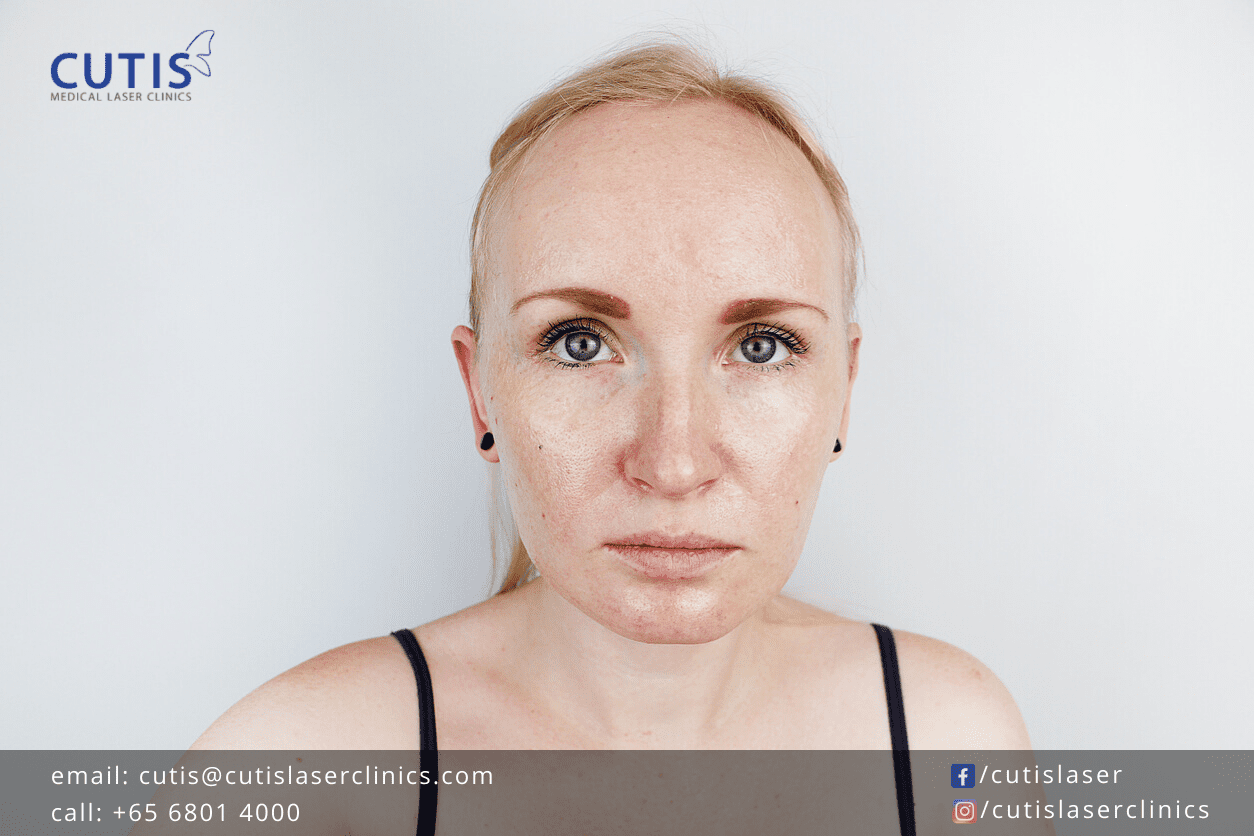If you have oily skin, you have probably tried lots of tips and tricks to reduce shine and de-grease your face. Unfortunately, many of these are inaccurate or just plain wrong. It is important to separate the fact from fiction, so you’ll know what works in keeping your oily skin under control.

Here are the top 5 misconceptions about oily skin:
1. Oily skin needs harsh or aggressive cleansers.
While cleansers and toners with harsh ingredients can remove excess oil, they can also leave your skin dehydrated and irritated. When this happens, you’ll begin to see lines, dullness, and exacerbated skin conditions. Over drying or stripping can also signal your skin to produce more oil.
Your skin should not feel tight or squeaky clean, so it is best to avoid harsh or aggressive cleansers. Choose a formula that can get rid of excess oil without stripping your skin. Also, be sure to avoid over washing, as this can only irritate skin and worsen oiliness.
2. Oily skin means dirty skin.
Having a shiny face or getting frequent breakouts does not necessarily mean that your skin is dirty. Excess oil and acne are not caused by dirt, but by fluctuating hormones. Oily skin, furthermore, has a genetic component to it and tends to run in families. If your parents have oily skin, you are likely to suffer the same fate.
The belief that excess oil and acne is caused by dirty skin has led many people to over strip their skin. This could be due to over washing the face, over exfoliating, or using aggressive cleansers.
3. Fatty or oily foods can cause oily skin.
The oil from your fries, pizza, burger and other oily foods does not have the same component as your skin sebum. Oily skin is mostly genetic and is not necessarily caused by foods. Your hormones also play a big role, as a rise in certain hormone levels can trigger higher sebum production.
If certain foods, however, seem to make your oily skin or breakouts worse, it is best to avoid them. A diet high in dairy and sugar is known to trigger inflammation, which can then affect the skin. It can aggravate existing breakouts and contribute to clogged pores and acne. Read on and learn how sugar affects your skin.
4. You don’t need to moisturize oily skin.
If your face looks greasy or shiny most of the time, you might think that applying moisturizer will only make it worse. This is not necessarily true because many those who struggle with oily skin have dehydrated skin (lacks water). With this skin type, the body will overcompensate by producing more oil.
It is, of course, recommended to find a product that will not add excess oil to your face. Look for a light or oil-free moisturizer; avoid heavy or rich creams and lotions. Deep Hydrating Moisturizer from Dr. Sylvia Skin Care hydrates and strengthens the skin without clogging your pores or causing breakouts.
5. A little bit of sun exposure can help with oily skin.
Although sunlight may provide a drying effect on the skin, it won’t help with acne or oily skin. Spending time in the sun can only dehydrate your skin and make it look dull. Not having enough oil can also cause your sebaceous glands to overcompensate by producing excess oil.
Do take note that the drying effect of the sun is only temporary and not the same to those of cleansers and acne medications. Overexposure to UV rays can only make your breakout worse and increase your risk of having more blemishes and pigmentation.
Managing oily skin
While you can’t change your genes, there are things you can do to control grease and shine. Here are some things you can try:
- Use blotting papers – this is to absorb excess oil from your face and make it appear less shiny or greasy temporarily.
- Protect skin from the sun – wear a broad-spectrum sunscreen every day to prevent sun damage and worsening of blemishes.
- Consider OTC acne medications – products with salicylic acid, glycolic acid, and benzoyl peroxide can remove excess sebum, get rid of dead skin cells, and control mild breakouts.
- Try clay masks – this can help absorb excess oil and remove skin impurities, as well as calm existing breakouts.
- Wash and moisturize daily – wash your face twice a day and after sweating, and be sure to apply an oil-free moisturizer afterwards.
- Consider aesthetic treatments – some non-invasive procedures can also help with oily skin and other skin concerns. These include:
- VI Peel – this contains a special formulation that can fight acne, soften wrinkles, lighten age spots, and stimulate collagen production.
- Clarifying facial with Sapphire – this features the Sapphire Blue Light Therapy and can clear pores, kill acne-causing bacteria, heal the skin, and treat other skin surface problems.
- Hydra dermabrasion – removes impurities and excess sebum using water and oxygen; it can replenish the skin and help with oiliness, congestion, enlarged pores, fine lines, and uneven skin tone and texture.
Take control of your oily skin! Contact Cutis Medical Laser Clinics in Singapore and schedule a consultation with our aesthetic doctor to find out the right treatment for your skin concerns.
- If you would like to be an informed patient, please contact us at +65-6801-4000 or
cutis@cutislaserclinics.com. - Cutis Medical Laser Clinics, 9 Scotts Road Pacific Plaza, Scotts Medical Center #08-07, Singapore – 228210
+65-6801-4000 - cutis@cutislaserclinics.com
